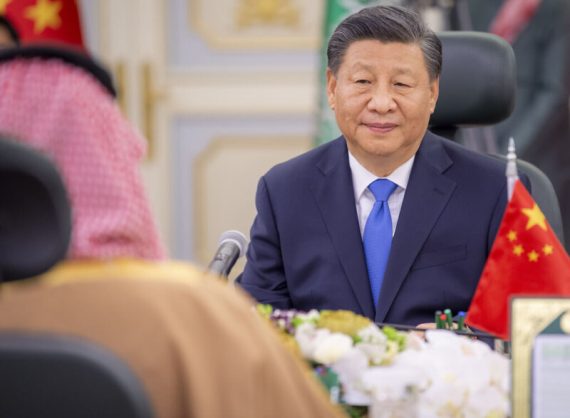C
hinese President Xi Jinping’s visit to Riyadh last week marked the opening of a new period of bolstering Sino-Gulf relations that have already been on the rise. In his keynote speech, Jinping underlined five key areas of cooperation: energy, finance and investment, science and technology, aerospace, and culture. Solidarity, collaboration, and common prosperity have become the main characteristics of Beijing’s official discourse in explaining the prospects for this visit to the region.
For the Gulf Cooperation Council (GCC) countries, which host their biggest international commercial partner, Xi’s official visit will bolster areas of cooperation while mitigating any areas of contention. Traditionally, Sino-Gulf relations remained primarily confined to economic cooperation. However, this partnership could well develop beyond that even if Beijing has a long way to go to counter the entrenched American presence in the region.
Economic cooperation as a gateway
Beijing has long been accustomed to relying on economic cooperation to achieve a larger influence in its investment landscape. For instance, the Belt and Road Initiative (BRI) created lucrative business opportunities for China while functioning as a soft power instrument. Bolstering economic cooperation to reach common prosperity is the most commonly used theme by Chinese policymakers. Predictably, President Xi Jinping used the same rhetoric to woo the Gulf region.
China and GCC are inevitable partners in commerce. The bilateral trade volume reached $232.1 billion in 2021. The joint statement underlined that both sides would further develop ties in finance, investment, energy, and technology. During the first days of the visit, approximately $29.3 billion worth of trade deals and a memorandum of understanding for BRI investments were signed.
It seems that China-Gulf relations will gain momentum in the economic field, and China will diversify its engagement in multiple areas. Another sign that economic cooperation paves the way for more Chinese influence is that Xi Jinping highlighted the priority of Yuan settlement for gas and oil transactions. These could be the first steps into lessening petrodollar hegemony in the Gulf and a major sign of defiance towards Washington.
A delicate equilibrium
Although China views the Gulf primarily from the prism of economic cooperation, this complex relationship will need more than money to develop into a strategic alliance. In this context, there are two delicate balances to be maintained. First, China needs to calibrate its relations between Saudi Arabia and Iran. The former is its largest trading partner within the GCC, and the latter has long-standing economic and military ties with Beijing. Incidentally, Tehran and its proxies continue to represent a major security menace for the Saudis.
Already Tehran expressed resentment towards Beijing’s charm offensive in the Gulf, depicting it as a “betrayal”. The islands of Greater Tunb, Lesser Tunb, and Abu Musa, which Iran occupies, were mentioned in the joint statement in the context of seeking a peaceful resolution. These islands remain the subject of heated disagreements between Iran and the UAE. Unsurprisingly, the Iranian official news agency did not translate this part of the statement in its report about the GCC meeting, and Tehran summoned the Chinese envoy, revealing Tehran’s uneasiness vis-à-vis the Chinese rapprochement with the Gulf countries.
The second is the GCC’s own balancing act between China and the U.S. The Saudis aspired to use the recent summit as a bandwagon to get the GCC behind its policies. By doing so, Riyadh presented a facade of Gulf harmony while sending key foreign policy messages. However, beyond the veneer of unity, existing disagreements in the Gulf continue to hinder Riyadh’s aspirations.
The UAE, for example, was underrepresented during the recent GCC-China summit held in Riyadh. This is not a good omen and could indicate the existence of major divergences in foreign policy approaches between Abu Dhabi and Riyadh. Therefore, a common Gulf foreign policy position towards China is not as straightforward as it seems.
Recommended
China’s pivot to the Gulf
Apart from these delicate balances, the political dimension of China’s pivot to the Gulf will be decisive. Exchanging energy supplies for security has been the lynchpin of the region’s relationship with the U.S. Washington, as the traditional security guarantor of the Gulf in the second part of the 20th century, has played a vital part in entrenching this relationship. Although there is a perception that the U.S. has gradually begun to withdraw from the region, it would not be judicious to say that this withdrawal will produce a geopolitical vacuum that Beijing can fill.
There are a few impediments to such a potential posture. China has to first address its strategic doctrine which is based on the “non-interference” principle, which is normally part of the main themes governing China’s foreign policy, also known as the Five Principles of Peaceful Coexistence. Second, the U.S. has already a network of air, army, and naval bases in the region.
How could China assume a similar protective role does not seem conceivable in the near to medium term. Last, China is currently not interested to conduct such a role. In the joint statement, China stated it seeks to mutually preserve its non-interference policy in conducting diplomatic relations and prefers to avoid criticizing the internal affairs of another sovereign nation.
GCC’s lack of collective defence and foreign policy policies
The GCC’s lack of collective defence, combined with difficulties in adopting a common foreign policy, will continue to underline the vitality of the U.S. presence in the region in the upcoming period. Although the joint statement mentioned the common security partnership as a prospective target, it is not included in the five key areas of cooperation and the language remained vague. The Gulf countries will ultimately need more than ambiguous verbiage like partnership or dialogue but something rather concrete such as air defence systems or fighter jets.
Meanwhile, Beijing’s bragging about these developments is telling. “We are mindful of the influence that China is trying to grow around the world. The Middle East is certainly one of those regions where they want to deepen their level of influence,” said John Kirby, White House National Security Council spokesman.
China’s engagement with the Gulf countries will not only continue in the economic field but will expand. However, to go beyond the economic dimension, Beijing will need to make serious reviews to its foreign policy doctrine and strategies. A shift from non-interference to a more interventionist stance would open more doors to Beijing in the Gulf, but it will also entangle China in the complex conundrum of the region. Furthermore, it will represent a sudden shift from the traditional Chinese neutrality and a significant rupture in its foreign policy. Whether Beijing is ready for such a shift remains to be seen.





